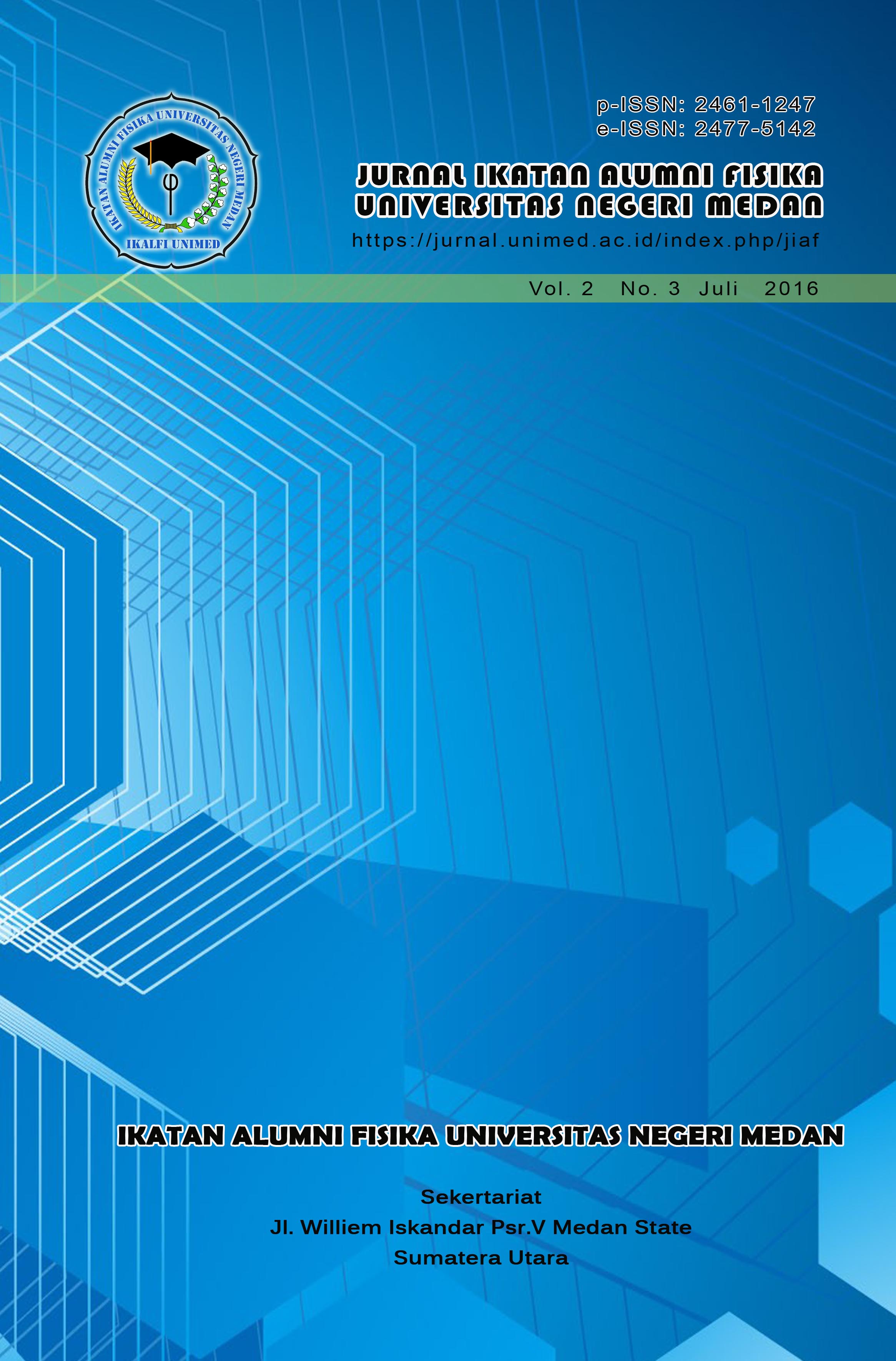PENGARUH INQUIRY TRAINING BERBASIS EKSPERIMEN RIIL DAN KEMAMPUAN BERPIKIR KRITIS TERHADAP HASIL BELAJAR SISWA PADA MATERI FLUIDA STATIS
DOI:
https://doi.org/10.24114/jiaf.v2i3.5689Keywords:
Inquiry Training Model, Real Experiment, Critical Thingking ApproachAbstract
This study aims to determine the effect of Inquiry Training learning model based real experiment and Critical Thinking Approach toward student™s learning outcomes in the subject matter of Static Fluid of class X MAN 1 Stabat T.P. 2015/2016. This study was quasi experiment. Sampling was done by cluster random sampling, with a sample of two classes, class X-3 as an experimental class and class X-1 as an convensional class. The instrument used to determine student learning outcomes are result test in the form of 15 multiple-choice questions with 5 options, and the instrument used to critical thinking approach is 10 essay tests that have been validated by the validator. The data obtained are the result of pretest, posttest, and critical thingking approach test. Furthermore, the data is analyzed statistically consisting of normality test, homogeneity, hypothesis testing and ANAVA two ways. The results showed that: 1) there was an effect of Inquiry Training learning model based real experiment toward student™s learning outcomes, 2) there was an effect of high crtitcal thinking and low critical thinking toward student™s learning outcomes, 3) the effect of Inquiry Training learning model based real experiment and Critical Thinking Approach toward student™s learning outcomes of class X MAN 1 Stabat T.P. 2015/2016.References
Hannum, F., Bukit, N., (2014), Pengaruh Model Pembelajaran Inquiry Training Terhadap Hasil Belajar Siswa, Jurnal INPAFI Vol. 2, No. 4 hal: 139 - 147
Joice, B., Weil, M., Calhoun, E., (2011), Models Of Teaching (terjemahan). Penerbit Pustaka Pelajar, Yogyakarta
Marpaung, M., Simamora, P., (2013), Pengaruh Model Pembelajaran Inquiry Training Berbasis Mindscaping Terhadap Hasil belajar Siswa Pada Sub-Materi Pokok Cahaya Di Kelas VIII Semester II SMP Negeri 3 Pematangsiantar T.P 2012/2013, Jurnal INPAFI hal: 136 “ 143
Riyadi, U., (2008), Model Pembelajaran Inkuiri Dengan Kegiatan Laboraturium Untuk Meningkatkan Keterampilan Berpikir Kritis Siswa pokok Bahasan Fluida Statis, Tesis, Universitas Negeri Semarang
Sagala, S., (2012). Konsep dan Makna Pembelajaran. Penerbit Alfabeta, Bandung
Simbolon, D.H., Sahyar, (2013), Efek Model Pembelajaran Inkuiri Terbimbing Berbasis Eksperimen Riil Dan Laboratorium Virtual Terhadap Aktivitas Dan Hasil Belajar Fisika Siswa SMA Methodist 1 Medan, Jurnal Pendidikan Dan Kebudayaan, Vol.21 No.3 hal: 299 “ 315
Trianto, (2011), Mendesain Model Pembelajaran Inovatif-Progresif Konsep, Landasan, dan Implementasinya Pada Kurikulum Satuan Tingkat Pendidikan, Penerbit Kencana, Jakarta
Trianto, (2014), Model Pembelajaran Terpadu, Penerbit Bumi Aksara, Jakarta
http://pendidikanindonesia.com, di-akses pada tanggal 13 Januari 2016).
Downloads
Published
Issue
Section
License
Copyright (c) 2017 JURNAL IKATAN ALUMNI FISIKA

This work is licensed under a Creative Commons Attribution 4.0 International License.
Authors who publish with this journal agree to the following terms:- Authors retain copyright and grant the journal right of first publication with the work simultaneously licensed under a Creative Commons Attribution License that allows others to share the work with an acknowledgement of the work's authorship and initial publication in this journal.
- Authors are able to enter into separate, additional contractual arrangements for the non-exclusive distribution of the journal's published version of the work (e.g., post it to an institutional repository or publish it in a book), with an acknowledgement of its initial publication in this journal.
- Authors are permitted and encouraged to post their work online (e.g., in institutional repositories or on their website) prior to and during the submission process, as it can lead to productive exchanges, as well as earlier and greater citation of published work (See The Effect of Open Access).

